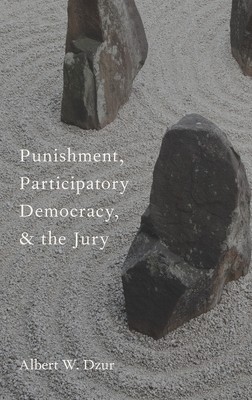
- We will send in 10–14 business days.
- Author: Albert W Dzur
- Publisher: Oxford University Press, USA
- ISBN-10: 0199874093
- ISBN-13: 9780199874095
- Format: 16 x 23.9 x 2.3 cm, kieti viršeliai
- Language: English
- SAVE -10% with code: EXTRA
Reviews
Description
Focusing contemporary democratic theory on the neglected topic of punishment, Punishment, Participatory Democracy, and the Jury argues for increased civic engagement in criminal justice as an antidote to the American penal state. Albert W. Dzur considers how the jury, rather than merely expressing unreflective public opinion, may serve as a participatory institution that gathers and utilizes citizens' juridical capabilities. In doing so, the book resists trends in criminal justice scholarship that blame increases in penal severity on citizen participation and rejects political theorists' longstanding skepticism of lay abilities.
Dzur distinguishes constructive citizen involvement that takes responsibility for public problems from a mass politics mobilized superficially around single issues. This more positive view of citizen action, which was once a major justification for the jury trial, is now also manifest in the restorative justice movement, which has incorporated lay people into community boards and sentencing circles. Both jury trials and restorative justice programs, Dzur explains, are examples of rational disorganization, in which lay citizen action renders a process less efficient yet also contributes valuable qualities such as attunement, reflectiveness, and full-bodied communication. While restorative justice programs and participatory policy forums such as citizens' juries have become attractive to reformers, traditional juries have suffered a steep and troubling decline. Punishment, Participatory Democracy, and the Jury advocates a broader role for jurors in the criminal courts and more widespreaduse of jury trials. Though no panacea for a political culture grown too comfortable with criminalization and incarceration, participatory institutional designs that rationally disorganize punishment practices and slow down criminal justice can catalyze civic responsibility and public awareness about the need to find alternative paths forward for America's broken penal system.
EXTRA 10 % discount with code: EXTRA
The promotion ends in 22d.17:48:26
The discount code is valid when purchasing from 10 €. Discounts do not stack.
- Author: Albert W Dzur
- Publisher: Oxford University Press, USA
- ISBN-10: 0199874093
- ISBN-13: 9780199874095
- Format: 16 x 23.9 x 2.3 cm, kieti viršeliai
- Language: English English
Focusing contemporary democratic theory on the neglected topic of punishment, Punishment, Participatory Democracy, and the Jury argues for increased civic engagement in criminal justice as an antidote to the American penal state. Albert W. Dzur considers how the jury, rather than merely expressing unreflective public opinion, may serve as a participatory institution that gathers and utilizes citizens' juridical capabilities. In doing so, the book resists trends in criminal justice scholarship that blame increases in penal severity on citizen participation and rejects political theorists' longstanding skepticism of lay abilities.
Dzur distinguishes constructive citizen involvement that takes responsibility for public problems from a mass politics mobilized superficially around single issues. This more positive view of citizen action, which was once a major justification for the jury trial, is now also manifest in the restorative justice movement, which has incorporated lay people into community boards and sentencing circles. Both jury trials and restorative justice programs, Dzur explains, are examples of rational disorganization, in which lay citizen action renders a process less efficient yet also contributes valuable qualities such as attunement, reflectiveness, and full-bodied communication. While restorative justice programs and participatory policy forums such as citizens' juries have become attractive to reformers, traditional juries have suffered a steep and troubling decline. Punishment, Participatory Democracy, and the Jury advocates a broader role for jurors in the criminal courts and more widespreaduse of jury trials. Though no panacea for a political culture grown too comfortable with criminalization and incarceration, participatory institutional designs that rationally disorganize punishment practices and slow down criminal justice can catalyze civic responsibility and public awareness about the need to find alternative paths forward for America's broken penal system.


Reviews